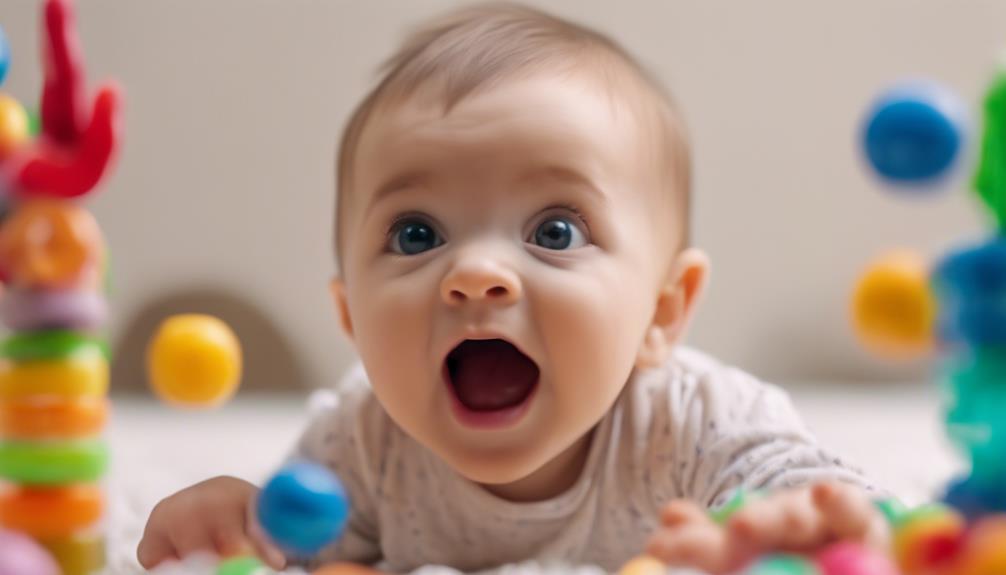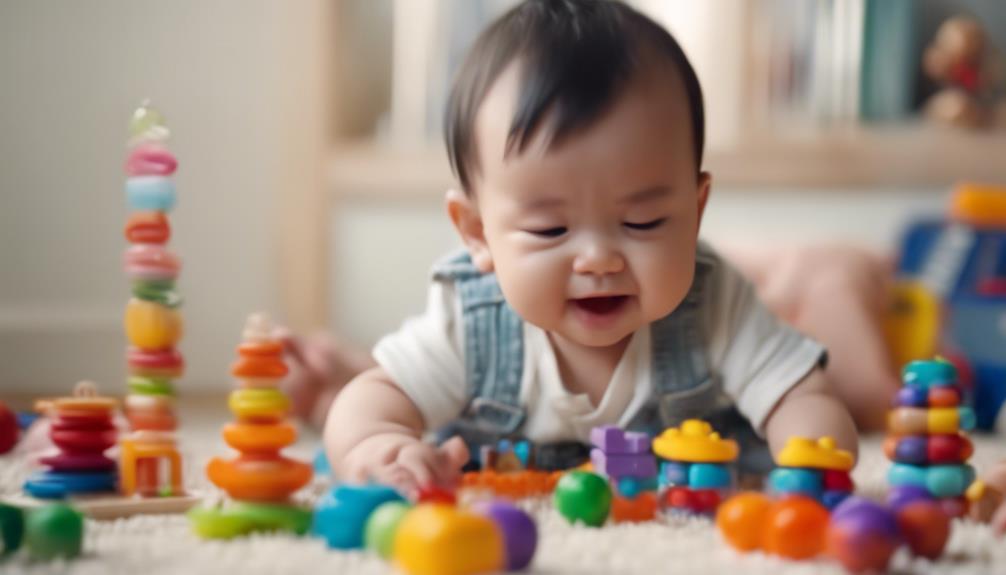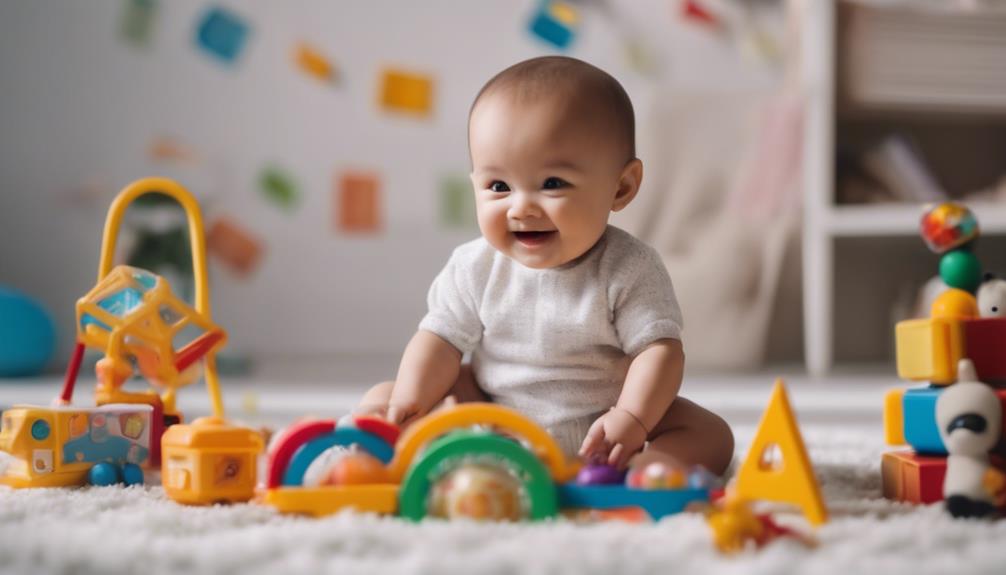Tracking your baby’s intellectual development involves keeping an eye out for important milestones. Progress in thinking, problem-solving, and sensory experiences indicate cognitive growth and skill acquisition. It’s crucial to monitor areas like social interaction, language acquisition, and motor skills. Play is essential for intellectual development as it helps enhance problem-solving abilities and creativity. By identifying developmental markers and seeking assistance from professionals when necessary, you can effectively support your baby’s growth. Understanding these milestones offers valuable insights into your baby’s cognitive and skill progress.
Key Takeaways
- Tracking cognitive milestones like babbling and first words.
- Monitoring social connections and early problem-solving skills.
- Seeking professional guidance for developmental concerns.
- Encouraging play activities for intellectual growth.
- Regular well-baby check-ups for monitoring development.
Cognitive Development Overview
To gain a deeper insight into how infants and toddlers learn and grow, let's explore an overview of their cognitive development. Cognitive development in infants and toddlers is an intriguing process that involves a series of milestones indicating the progress in their thinking, learning, and problem-solving abilities.
During the first three years of life, significant changes occur in their brains, shaping the way they perceive and interact with the world around them. These cognitive milestones serve as guidelines for understanding the typical growth patterns in children and the development of skills like memory, language, and attention.
Nurturing and responsive care are essential components that contribute to healthy brain development and cognitive skills in infants and toddlers. By providing consistent and nurturing experiences, interactions, and appropriate materials for exploration, caregivers can support and enhance the cognitive development of young children.
Through activities like cuddling, exposure to language, and opportunities for exploration, infants and toddlers gradually build the foundation for their cognitive abilities, setting the stage for future learning and growth.
Early Sensory Stimulation
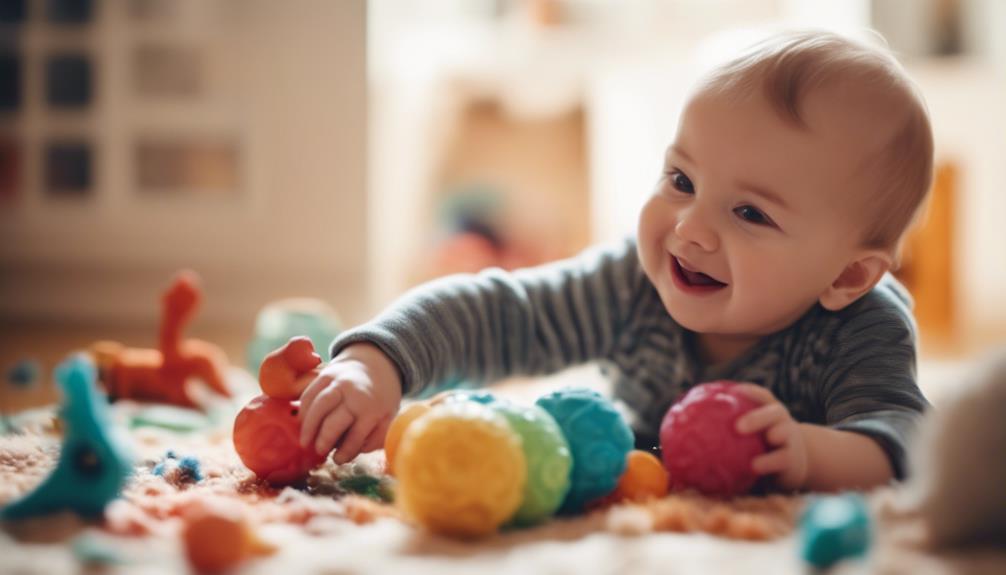
Engaging babies in sensory experiences during their early development is essential for fostering cognitive skills and social-emotional growth. Here are three key ways sensory stimulation supports your baby's development:
- Enhanced Cognitive Skills:
Sensory stimulation, such as playing with colorful toys or exploring different textures, helps babies process information from their environment. This processing lays the groundwork for learning, memory retention, and overall cognitive abilities.
- Supporting Sensory Development:
Activities like tummy time, reaching for toys, and tracking moving objects are important for stimulating your baby's senses. These activities encourage sensory exploration, leading to better sensory processing and integration.
- Promoting Social and Emotional Growth:
Engaging in sensory experiences fosters positive interactions and bonding between you and your baby. These interactions not only support emotional development but also lay the foundation for healthy social relationships later in life.
Social Interaction Progress
When it comes to your baby's social development, eye contact plays a significant role.
By engaging in eye contact, your baby learns important communication skills and begins to understand turn-taking in interactions.
Encouraging these early social behaviors can help your little one build strong relationships and feel secure in their environment.
Eye Contact Importance
Making eye contact is an essential aspect of social interaction that greatly contributes to babies' bonding and communication skills development. When your baby engages in eye contact, it signifies their readiness to connect with you and others around them.
Here are three key reasons why eye contact is important for your baby's social development:
- Bonding: Establishing eye contact with your baby helps build a strong emotional connection and fosters trust between you and your little one.
- Communication: Through eye contact, babies learn to interpret facial expressions and non-verbal cues, which are essential for understanding emotions and intentions in social interactions.
- Social Skills: Encouraging eye contact through positive interactions supports your baby in developing essential social skills, such as turn-taking and forming secure attachments with caregivers.
Turn-Taking Skills Development
Developing turn-taking skills in babies is essential for their progress in social interactions. Children learn these skills through simple games like peek-a-boo and passing toys back and forth. By engaging in turn-taking, infants start to grasp the flow of conversations and form social connections. Encouraging this developmental milestone from an early age sets a solid foundation for future communication abilities.
Milestones in turn-taking can also serve as indicators of healthy social development in children. As babies interact with caregivers and peers in a back-and-forth manner, they not only enhance their social skills but also build trust and understanding within relationships. Through turn-taking, children begin to comprehend the give-and-take nature of social interactions, which is essential for maneuvering various social settings as they grow.
Language Acquisition Milestones
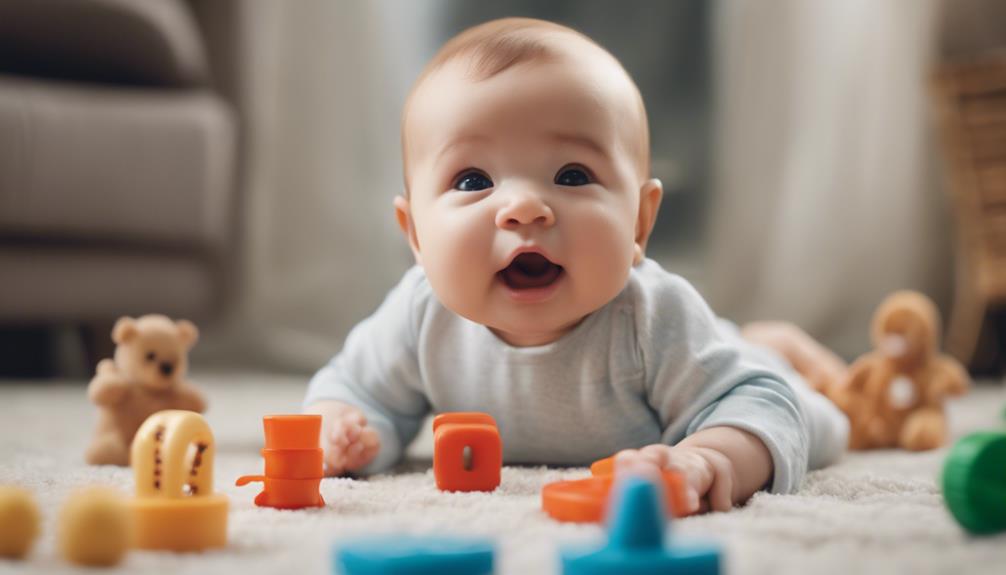
As your baby grows, they'll reach significant language acquisition milestones. These milestones include the first words and sounds they utter.
Expanding their vocabulary and developing language comprehension skills are also important milestones to look out for. Understanding these stages can help you support and encourage your child's language development.
As they progress through each milestone, it is essential to provide a nurturing environment that fosters their language skills.
First Words and Sounds
Around 2 to 4 months of age, babies typically begin cooing and babbling, marking the initial stages of their language development journey. Here are some milestones to watch for in the domain of first words and sounds:
- Cooing and Babbling: Initially, your baby will start making soft vowel sounds like 'ooh' and 'aah,' gradually progressing to more complex babbling with consonant-vowel combinations like 'ba-ba' or 'goo-goo.'
- Responsive Sounds: By around 6 months, your baby may start responding to their name and producing a wider range of sounds to express their needs and emotions, such as squeals of delight or sounds of discontent.
- First Words: As your baby approaches their first birthday, they may utter their first recognizable words like 'mama' or 'dada,' showing significant strides in their language development journey.
These early language milestones are essential steps that pave the way for your baby's communication skills to flourish in the months ahead.
Vocabulary Expansion
By 12 months of age, babies typically begin expanding their vocabulary by saying their first words. This milestone marks the beginning of a significant phase in your child's language acquisition journey.
As your child's brain develops, they'll gradually start to grasp more words and phrases. Around 18 months, most children can say about 10-20 words and understand even more.
Between 2-3 years old, toddlers will begin forming short sentences and rapidly expanding their vocabulary.
Encouraging this vocabulary growth is essential as it forms the foundation for your child's future academic success. Reading to your child regularly is a fantastic way to boost their language acquisition skills and overall cognitive development.
Language Comprehension Skills
How do babies develop their language comprehension skills as they grow? Understanding the milestones for infants in language acquisition is important for tracking their progress.
Here are some key points to keep in mind:
- Early Recognition of Words and Commands: Between 6-12 months, babies start grasping simple words and responding to basic commands. This is an essential first step in their language comprehension journey.
- Progression to Basic Communication: By 18 months, most infants can follow straightforward directions and comprehend simple questions. This marks a significant advancement in their ability to understand and interact through language.
- Emergence of Sentences and Conversations: Around 2 years old, toddlers begin combining words to form short sentences, enabling them to express their needs more clearly. By age 3, children can engage in basic conversations, ask questions, and comprehend more complex language structures.
Encouraging language development through activities like reading, talking, and singing to babies can greatly enhance their comprehension skills and nurture their linguistic abilities.
Motor Skills Development
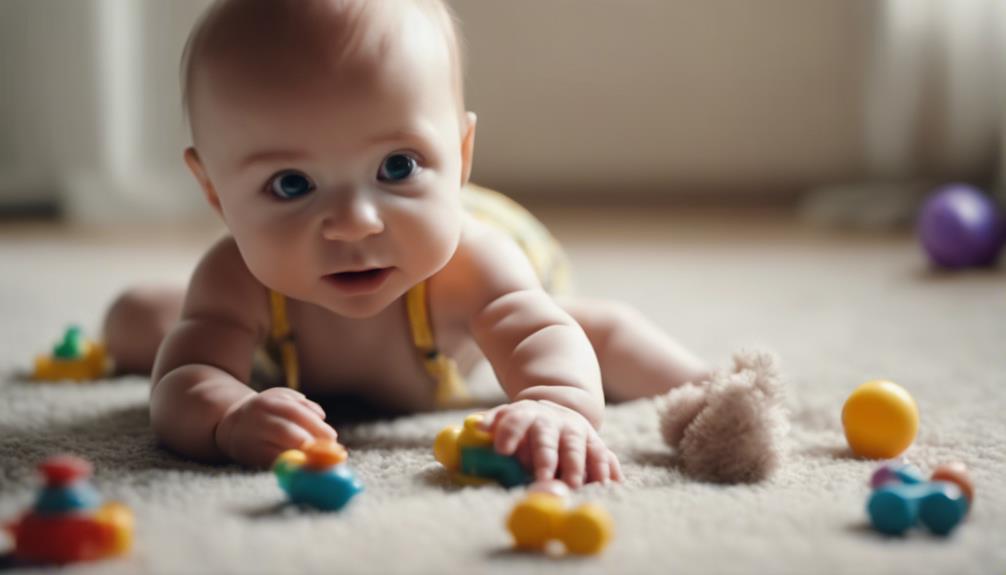
Developing motor skills is an essential aspect of your baby's early growth and physical development. Motor skills encompass both gross motor skills, such as crawling and walking, and fine motor skills, like grasping objects and picking up small items.
Babies typically progress through motor skills developmental milestones in a predictable sequence, though the age at which they achieve these milestones can vary. Engaging in activities like tummy time, offering toys to grasp, and interactive play can aid in promoting your baby's motor skills development.
These skills are critical for enhancing your baby's overall physical coordination, balance, and ability to explore their surroundings. Monitoring your baby's motor skills milestones can offer valuable insights into their neurological development and help identify any potential areas of concern.
Cognitive Milestones Checklist
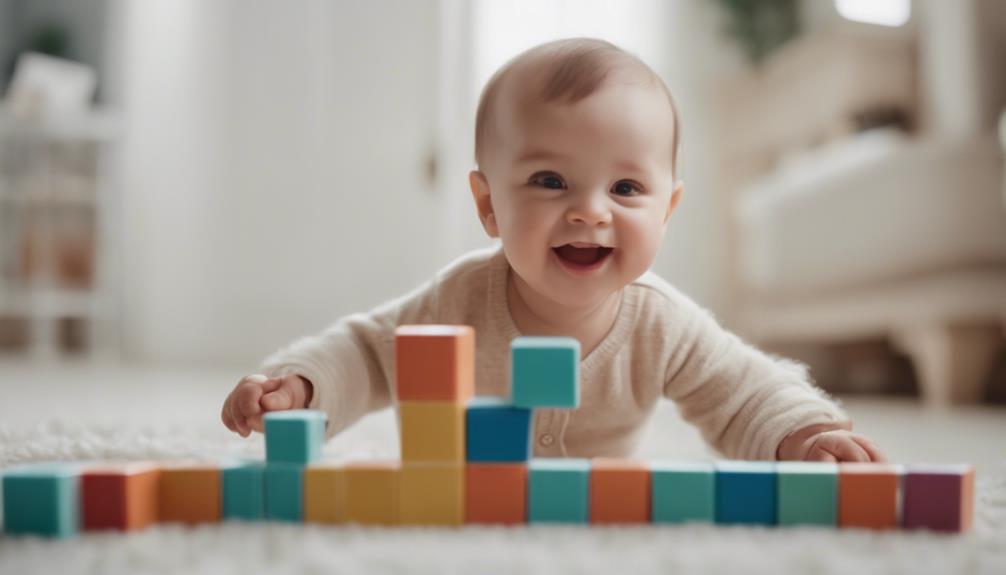
Shifting from emphasizing motor skills development, let's now explore the cognitive milestones checklist for your baby's intellectual progress. Keep an eye out for the following developmental milestones:
- Recognizing Familiar Faces: Infants typically start recognizing familiar faces early on, showing an understanding of their surroundings and forming important social connections.
- Exploring with Objects: By 12 months, babies may begin putting objects in containers, following simple directions, and exploring through actions like banging or shaking items, enhancing their problem-solving skills.
- Pretend Play: As toddlers reach 2 years old, engaging in pretend games becomes common. This imaginative play not only fosters creativity but also supports cognitive development by enhancing language skills and understanding of abstract concepts.
Watching for these milestone checklists can help you track your baby's cognitive progress and make sure they're hitting key developmental markers.
Importance of Play
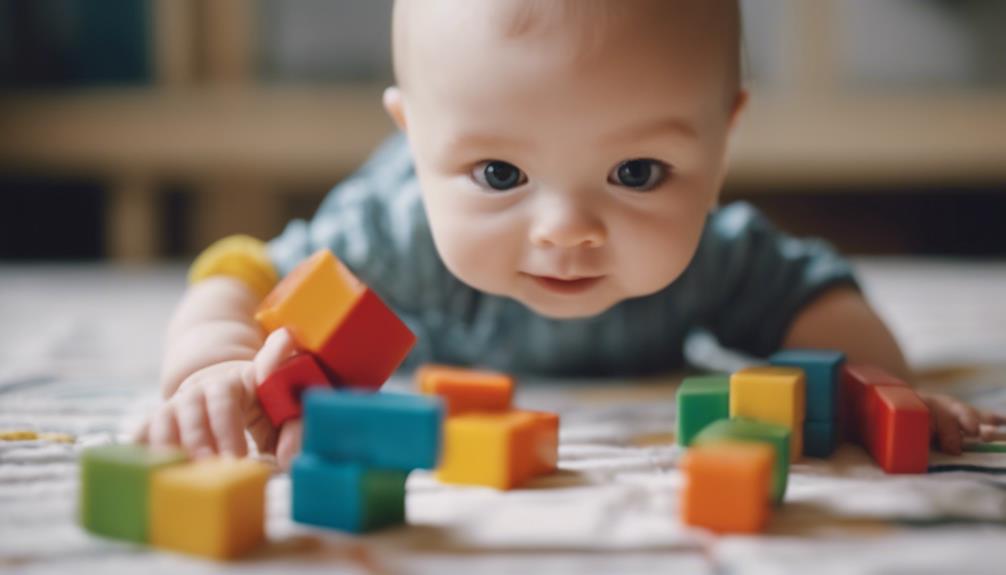
During early childhood, play serves as an essential catalyst for fostering your baby's intellectual development. Play isn't just about having fun; it plays a key role in your baby's overall growth and learning.
Through play, your little one engages in activities that encourage exploration, creativity, and problem-solving skills, all of which are fundamental for their cognitive development. By interacting with toys and caregivers, babies learn about cause and effect, spatial awareness, and develop their cognitive abilities.
Different types of play, such as sensory play, imaginative play, and manipulative play, all contribute to various aspects of your baby's intellectual growth. Interactive play with caregivers not only promotes social and emotional development but also stimulates intellectual growth.
Providing a variety of age-appropriate toys and activities further enhances your baby's intellectual development. So, make sure to prioritize playtime as a fundamental part of your baby's developmental journey.
Monitoring Response to Stimuli
Regularly monitoring your baby's responses to stimuli is essential for understanding their visual and cognitive development. It's through observing how they react to various sensory inputs that you can gain valuable insights into their growing cognitive abilities.
Here are three key points to keep in mind when monitoring your baby's responses:
- Eye Tracking: Infants demonstrate responsiveness to stimuli by following and tracking moving objects with their eyes. This early skill showcases their visual processing and attention capabilities.
- Recognition of Familiar Faces: Around 2 months of age, babies can start recognizing familiar faces and objects even from a distance. This ability highlights their cognitive development in identifying and recalling important visual cues.
- Startle Reflex: Infants often startle at loud noises, indicating their sensory awareness and responsiveness. Monitoring these reflexes can provide clues about their sensory processing and integration skills.
Tracking your baby's responses to stimuli is a valuable tool in understanding their cognitive development and can help guide their learning experiences.
Seeking Professional Guidance
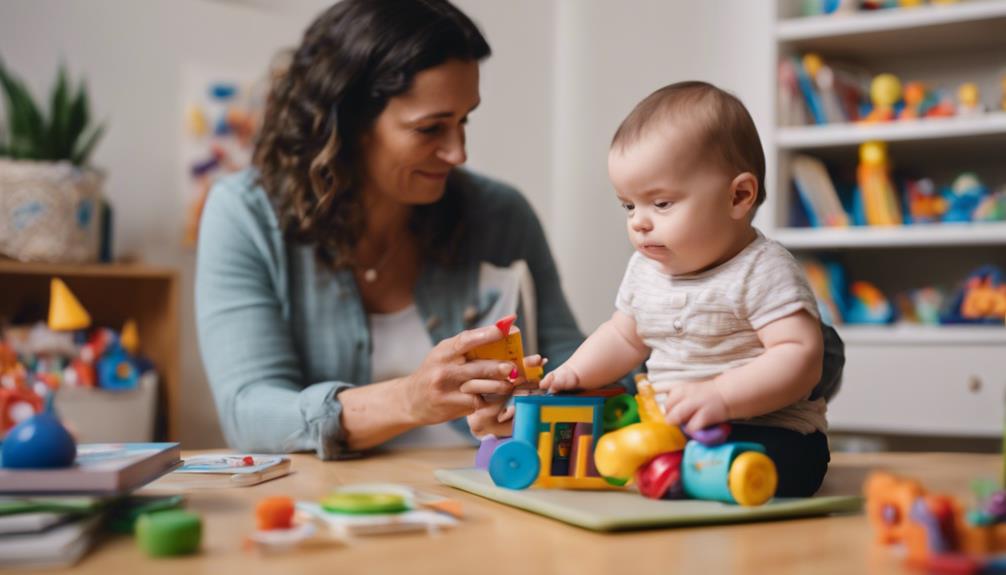
If you have concerns about your baby's intellectual development, seeking professional guidance is essential for addressing any potential issues effectively. Consult your baby's doctor or healthcare provider if you notice any delays or unusual behaviors related to intellectual milestones. They can provide guidance and may recommend developmental screening to assess your baby's progress accurately.
Attend regular well-baby check-ups to monitor your baby's intellectual growth and address any concerns promptly. If you suspect delays in your baby's intellectual milestones, don't hesitate to seek early intervention services. Early intervention can make a significant difference in your baby's development, so collaborate with specialists and professionals for tailored support and interventions.
Frequently Asked Questions
What Are Four Signs of Intellectual Growth in an Infant?
You can observe intellectual growth in infants through their interest in moving objects, recognition of familiar faces, and curiosity about their environment. Additionally, they may communicate emotions, manipulate objects, and follow simple directions as signs of development.
What Is the Intellectual Development in 0 to 3 Months?
In the first 3 months, your baby's intellectual development involves recognizing faces, tracking moving objects, and responding to sounds. They start showing curiosity and exploring the world through their senses. Keep engaging with them!
When to Be Concerned About Baby Milestones?
If your baby is not meeting developmental milestones like recognizing faces by 2 months or exploring toys by 6 months, it's time to be concerned. By 12 months, difficulty with simple tasks may indicate cognitive delays.
What Is a Cognitive Milestone of a Baby?
When tracking baby milestones, note that cognitive development involves recognizing faces, exploring with hands and mouth, transferring objects, watching objects fall, playing peek-a-boo, following simple directions, and enjoying books and songs.
Conclusion
Now that you have learned about the key milestones in your baby's intellectual development, it's important to continue monitoring their progress and seeking professional guidance when needed.
Remember, every child develops at their own pace, so don't be alarmed if they reach certain milestones later than others.
Stay engaged with your little one, provide plenty of opportunities for play and learning, and enjoy watching them grow and thrive.
Keep up the great work, and happy parenting!

